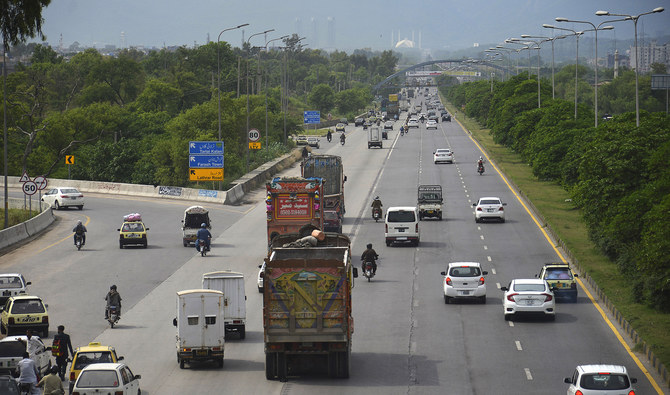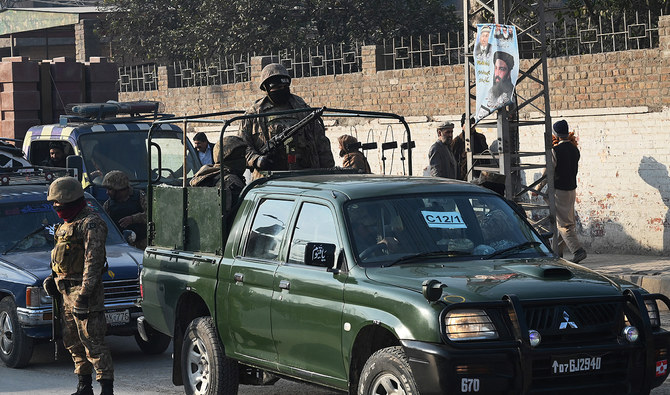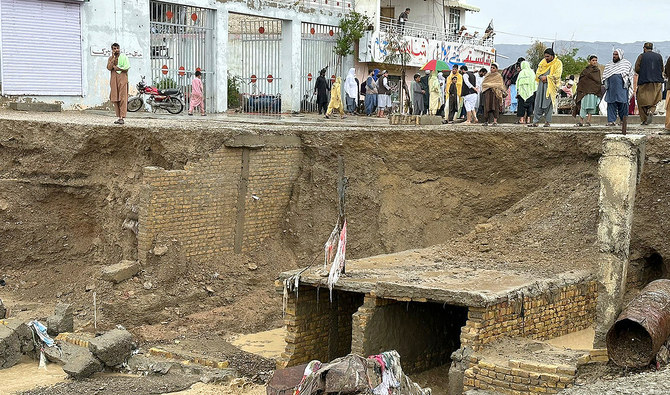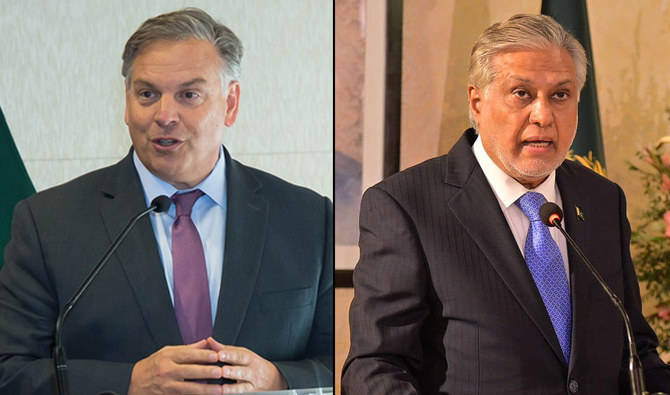KARACHI: As Pakistan focuses on stimulating growth and creating jobs in the upcoming federal budget, the country’s business community called for slashing taxes and introducing relief measures to bring the economy out of its sluggish mode while economists predicted that revenue collection would continue to constitute a major challenge for the government.
Pakistan is expected to present its income and expenditure plan for the next fiscal year (FY2020-21) in the coming week, with a focus to spur the economic growth without imposing new taxes.
“The focus of the upcoming budget is to stimulate growth and create jobs. The focus of the [$8 billion] stimulus package is toward providing support to business, in particular [small and medium enterprises] through payroll loans at subsidized rates, deferral of principal and interest payments for one year and quick disbursement of all as refunds to business,” Dr. Abdul Hafeez Shaikh, Adviser to Prime Minister on Finance and Revenue, told Arab News last week in an exclusive interview.
He also categorically denied that there would be new taxes in the upcoming budget.
Pakistan’s business community expects that the government will come up with a relief package for the revival of the country’s economy to avoid its further weakening amid the COVID-19 pandemic.
“We have proposed that the government should give relief to industries across the board like the one given to the construction industry because it is vital for the revival of the economy,” Agha Shahab Ahmed Khan, President of the Karachi Chamber of Commerce and Industry (KCCI), told Arab News. “The reforms and recovery will automatically follow.”
Industrialists say the government must focus on the means of creating wealth by adopting appropriate measures and offering suitable incentives such as the ones witnessed in other countries. “If there is no wealth creation, there will be no wealth distribution. This may also lead to social disruption in the country,” the KCCI president said, adding: “We have suggested that sales tax should be brought down to a single digit from 17 percent to spur business activities.”
Industrialists also hope that apart from revising the tax rates, the number of taxes will also be reduced by the government. “We expect that the number of taxes will reduce as part of the ease of doing business initiative under the current circumstances. In Punjab, the government has imposed about 130 different taxes,” Almas Hyder, an industrialist and former president of the Lahore Chamber of Commerce and Industry (LCCI), told Arab News.
“The government must expedite the refund process,” she continued, adding: “I say this because this has impacted the cash flow of companies.”
Muhammad Ahmed, President of the Islamabad Chamber of Commerce and Industry (ICCI), concurred with Hyder, saying: “There is no doubt that refunds are being paid, but income tax refunds have not been issued. We should be given permission to adjust that money with the government in the shape of customs duties or sales tax.”
The ICCI president called for measures to make the upcoming budget business-friendly in the prevailing environment.
“The budget should be business-friendly since that will help us make the economy flourish. If new businesses cannot be set up, at least the existing ones that have suffered setbacks should be allowed to survive and sustain in these difficult times,” he added.
As business community demands relief in the upcoming budget, the country’s economists predict that the government is likely to face major revenue constraints due to a decline in the collection rate within the current economic framework. “If you have no income, you will not be able to make expenditures,” Dr. Abdul Qayyum Suleri, member of the government’s Economic Advisory Council (EAC), told Arab News.
“The second major challenge the government is facing is the locust attack which is going to cost the country about Rs 1 trillion in the worst case scenario. If the damage is contained, the loss will be about Rs 250 billion,” he added.
However, Dr. Khaqan Najeeb, who was part of the budget-making process last year since he worked as an adviser with the finance ministry, suggested that the next budget could be crafted with a different approach, keeping in mind resource generation through tax compliance, deficit reduction by curtailing expenditures, and deficit financing by shifting to non-debt creating instruments.
“Shifting the financing of budget to non-debt creating instruments is the only way to flatten the curve on debt build-up. Divestment, past recoveries, collecting dividends from state-owned companies, arrears of taxes and energy, all can contribute in financing the deficit. This can restore the public’s flagging faith in the integrity of the policymakers to break the debt cycle,” he added.
Dr. Suleri said that apart from debt servicing, defense and administrative costs and development expenditure’s additional resources would be required to fund the health sector and locust control operations.
“Pakistan will need about $15 billion of additional borrowing amid remittance, foreign investment and export decline,” he noted while observing: “Two sectors – energy and loss making public sector enterprises – will be under pressure since the International Monetary Fund may object to budget allocations. Increase in salaries and pensions may fall into this category.”
Economists expect that few ongoing development projects will be financed while major share of funds is likely to be diverted to the health sector in the current situation.
Pakistan’s industrialists hope for tax cuts, relief measures in budget
https://arab.news/vaund
Pakistan’s industrialists hope for tax cuts, relief measures in budget

- Business community demands reduction in rates and number of existing taxes for the revival of sluggish economy
- Economists believe revenue collection and locust control will pose major challenges to the government
Rain wipes out first Pakistan-New Zealand T20 after just two balls

- Fast bowler Mohammad Amir returned to international cricket after nearly four years
- Having come out of retirement last month, Amir’s participation was limited to just fielding
RAWALPINDI: Heavy rain caused the first Twenty20 international between Pakistan and New Zealand to be abandoned after just two deliveries in Rawalpindi on Thursday.
New Zealand skipper Michael Bracewell won the toss, which had also been delayed by 30 minutes, and opted to bat but no action was possible for two-and-a-half hours.
Umpires Ahsan Raza and Aleem Dar then announced a five-over-a-side game at 10:10 local time (9:10 GMT).
Pakistan paceman Shaheen Shah Afridi conceded two leg-byes to debutant Tim Robinson off the first ball before bowling the batsman with a sharp delivery off the next.
But as soon as the Pakistan fielders started celebrating the wicket, the rain returned to force an abandonment.
Fast bowler Mohammad Amir returned to international cricket after nearly four years, having come out of retirement last month, but his participation was limited to just fielding.
The 32-year-old retired in December 2020 after being dropped from the side but changed his mind last month and decided to restart his career, which had already been stalled by a match-fixing ban in 2010.
Pakistan handed T20I caps to batsman Usman Khan, spinner Abrar Ahmed and all-rounder Muhammad Irfan Khan, while Robinson debuted for New Zealand.
The remaining matches are in Rawalpindi on April 20 and 21 and in Lahore on April 25 and 27.
The series gives a chance to both teams to test their bench strength ahead of the Twenty20 World Cup to be held in June in the United States and the West Indies.
New Zealand are without nine key players, including skipper Kane Williamson, who are playing in the ongoing Indian Premier League.
Five custom officials among six killed in gun attack in northwest Pakistan

- Officials of the custom department attacked while on routine patrol in Dera Ismail Khan
- Latest killings come amid renewed violence in northwestern and southwestern regions
PESHAWAR: Six people, including five officials of the customs department, were killed and another wounded on Thursday when gunmen opened fire on their vehicle in the northwestern Khyber Pakhtunkhwa province, police and rescue officials said.
Officials of the custom department were out for routine patrol in Dera Ismail Khan city when their vehicle came under attack in the jurisdiction of Draban Police Station, Regional Police Officer Nasir Hussain Satti told Arab News.
“As terrorists started firing on the custom officials, the driver lost control of the vehicle,” Hussain said.
“As a result, their car collided head-on with another vehicle coming from the opposite direction, leaving five officials and a girl dead on the spot while one person suffered injuries.”
KP Chief Minister Ali Amin Gandapur condemned the incident.
“The incident is extremely tragic. Police should take all measures to arrest elements behind the attack,” a statement quoting the chief minister said.
Aziz Dotani, a spokesman at DI Khan district’s Rescue 1122 service, said a relief team promptly rushed to the area to transport bodies to the nearest medical facility.
The latest killings come at a time of renewed militant violence in Pakistan’s northwestern and southwestern regions, especially after the banned Tehreek-e-Taliban Pakistan (TTP) called off its fragile, months-long truce with the government in November 2022.
While there has been a spike in militant attacks across the northwest and southwest of the country, militants have particularly attacked policemen in Khyber Pakhtunkhwa in recent weeks.
Earlier this month, unidentified gunmen shot dead a policeman in the restive North Waziristan tribal district. Separately, an official working with the provincial counterterrorism department and a senior cleric affiliated with the Jamiat Ulema Islam religious political party were shot dead in two separate incidents of “targeted killings” in the North Waziristan tribal district, according to police.
While no group immediately claimed responsibility for the latest killings, suspicion is likely to fall on the TTP, which has had a significant presence in KP before being driven out as a result of successive military operations over the years. Pakistan says the TTP is now mostly based in hideouts in neighboring Afghanistan, which the Taliban denies.
Last month, seven Pakistani soldiers, including two army officers, were killed in a militant attack in North Waziristan, according to the Pakistani military. The attack led the Pakistani military to carry out rare airstrikes against suspected TTP hideouts inside Afghanistan on March 18, killing eight people. The strikes prompted Afghan forces to fire back at Pakistani soldiers along the border.
Afghan Deputy Interior Minister Mohammad Nabi Omari has urged Pakistan and the banned TTP to start negotiations afresh but Pakistan has rejected the Afghan minister’s suggestion, urging Kabul to take action against militant groups operating from its soil.
Both Pakistan and Afghanistan have traded blame in recent months over who is responsible for the recent spate of militant attacks in Pakistan.
Islamabad says the attacks are launched mostly by TTP members who operate from safe havens in Afghanistan. Kabul denies this and blames Islamabad for not being able to handle its own security challenges.
Seven killed in southwest Pakistan as heavy rains continue to wreak havoc nationwide

- At least 33 people killed and 46 injured in various rain-related incidents in northwestern Pakistan
- Pakistan is ranked fifth most vulnerable country to climate change according to Global Climate Risk Index
QUETTA: Seven people including a woman were killed in southwestern Pakistan as rains continue to wreak havoc in the South Asian nation ranked as the fifth most vulnerable country to climate change according to the Global Climate Risk Index.
Heavy rains in the last three weeks have triggered landslides and flash floods in several parts of Pakistan.
On Thursday, seven people were killed in the southwestern Balochistan province, officials in the town of Chaman here the deaths took place said.
“In the first incident a car drove into flood waters in Mashan Talab situated on the outskirts of Chaman,” Deputy Commissioner Chaman Raja Atthar Abbas told Arab News.
“Five men sitting inside the vehicle drowned in flood water while two people including a woman were killed after a mud wall fell on them on College road.”
Torrential rains had caused “severe damage” in Chaman and its surrounding areas as dozens of mud house collapsed in the last two days of rains, Abbas added.
Separately, at least 33 people were killed and another 46 injured in various rain-related incidents in Pakistan’s northwestern Khyber Pakhtunkhwa (KP) province in the last six days, the Provincial Disaster Management Authority (PDMA) said on Thursday.
Rains that began last Friday had completely destroyed 336 houses and partially damaged another 1,606 in different districts across the province, according to the PDMA.
The incidents occurred in Khyber, Upper and Lower Dir, Upper and Lower Chitral, Swat, Bajaur, Shangla, Karak, Tank, Mardan, Peshawar, Charsadda, Hangu, Battagram, Dera Ismail Khan and other districts.
“The deceased include 17 children, eight men, eight women, while the injured included 32 men, six women and eight children,” the PDMA said in its daily situation report on Thursday.
On Wednesday, the authority had warned of another spell of heavy rains in the province from April 17 till April 21, which could trigger landslides and flash floods.
In 2022, downpours swelled rivers and at one point flooded a third of Pakistan, killing 1,739 people. The floods also caused $30 billion in damages, from which Pakistan is still trying to rebuild.
Amir returns to international cricket as New Zealand bat in first T20I

- Amir retired in December 2020 after being dropped from the side but changed his mind last month
- Fast bowler decided to restart his career, which had also been stalled by a match-fixing ban in 2010
RAWALPINDI: Pakistan fast bowler Mohammad Amir returns to international cricket from an absence of almost four years after New Zealand won the toss in their rain-delayed first Twenty20 in Rawalpindi on Thursday.
The 32-year-old retired in December 2020 after being dropped from the side but changed his mind last month and decided to restart his career, which had also been stalled by a match-fixing ban in 2010.
Pakistan have handed T20I debuts to batter Usman Khan, spinner Abrar Ahmed and allrounder Muhammad Irfan Khan to gauge their bench strength ahead of June’s World Cup in the United States and the West Indies.
New Zealand, missing nine players due to the Indian Premier League, handed a T20I debut to batter Tim Robinson.
The remaining matches are in Rawalpindi on April 20 and 21 and in Lahore on April 25 and 27.
Teams:
Pakistan: Babar Azam (captain), Usman Khan, Abrar Ahmed, Iftikhar Ahmed, Mohammad Rizwan, Mohammad Amir, Muhammad Irfan Khan, Naseem Shah, Saim Ayub, Shadab Khan, Shaheen Shah Afridi
New Zealand: Michael Bracewell (captain), Mark Chapman, Josh Clarkson, Jacob Duffy, Dean Foxcroft, Ben Lister, Jimmy Neesham, Tim Robinson, Ben Sears, Tim Seifert, Ish Sodhi
Umpires: Ahsan Raza (PAK) and Aleem Dar (PAK)
Tv umpire: Faisal Afridi (PAK)
Match referee: Andy Pycroft (ZIM)
US says Pakistan’s prosperity and security remains a ‘top priority’

- Blome’s comments come amid a spike in militant attacks in Pakistan
- Pakistani finance chief has launched negotiations for a new IMF bailout
KARACHI: US Ambassador Donald Blome met Pakistani Foreign Minister Ishaq Dar on Thursday and said the South Asian nation’s prosperity and security remained a ‘top priority’ for Washington.
Blome’s comments come amid a spike in militant attacks in Pakistan and while its finance chief is in discussions with the International Monetary Fund in Washington on a potential follow-up program to its nine-month, $3 billion stand-by arrangement.
“US Ambassador Donald Blome met today with Foreign Minister Ishaq Dar to discuss recent events in the region,” Acting US Mission Spokesperson Thomas Montgomery said.
“Ambassador Blome conveyed the United States’ commitment to working with the government and people of Pakistan, underscoring that prosperity and security for Pakistan remains a top priority for the United States.”
Pakistan went to the polls on February 8 in a vote marred by a mobile Internet shutdown on election day, arrests and violence in its build-up and unusually delayed results, leading to accusations that the vote was rigged.
However, the US has repeatedly said it will work with the new government of Prime Minister Shehbaz Sharif, though it has expressed concerns about reported election irregularities and urged a probe.
Although defense and key foreign policy decisions are largely influenced by Pakistan’s powerful military, Sharif will have to juggle relations with the US and China.
Islamabad has close economic ties to both the nations, which has put it in a tricky position as the two countries have embarked upon a costly trade war.
“From our perspective it has to be an and-and discussion,” finance minister Muhammad Aurangzeb said in an interview this week when asked how the Sharif government plans to conduct its trading relationships with the world’s two largest economies.
“US is our largest trading partner, and it has always supported us, always helped us in terms of the investments,” he said. “So that is always going to be a very, very critical relationship for Pakistan.”
“On the other side, a lot of investment, especially in infrastructure, came through CPEC,” he said, referring to the roughly 1,860-mile-long China-Pakistan Economic Corridor designed to give China access to the Arabian Sea.
Aurangzeb said there was a “very good opportunity” for Pakistan to play a similar role in the trade war as countries like Vietnam, which has been able to dramatically boost its exports to the US following the imposition of tariffs on some Chinese goods.
“We have already a few examples of that already working,” he said. “But what we need to do is to really scale it up.”
Militancy has also spiked in recent months, creating a major challenge for the new government, with religiously motivated groups like the Pakistani Taliban as well as ethnic separatists showing an enhanced ability to hit high-value targets.
In an attack last month that has so far been unclaimed, a suicide bomber rammed a vehicle into a convoy of Chinese engineers working on a hydropower project at Dasu in the northwestern Khyber Pakhtunkhwa province, killing five Chinese nationals and their Pakistani driver.
The Mar. 26 assault was the third major attack in little over a week on China’s interests in the South Asian nation, where Beijing has invested more than $65 billion in infrastructure projects as part of its wider Belt and Road initiative.









